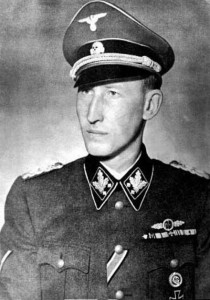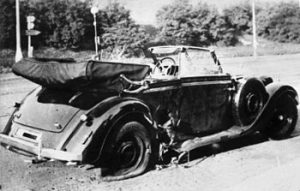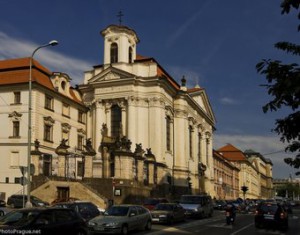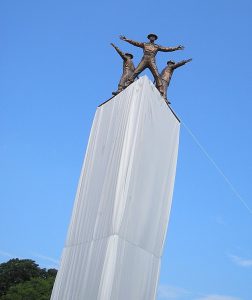The Assassination of Reinhard Heydrich
By Tracy A. Burns
June 4, 1942
When the head of Nazi security police and governor of the Protectorate of Bohemia and Moravia, Reinhard Heydrich, died 70 years ago, on June 4, 1942, due to wounds inflicted by Czech parachutists during an assassination attempt, it marked one of the highlights in the history of Czech resistance and proved a great blow to the Nazi war effort. The death of the man nicknamed “The Butcher” signified that even the top-ranking German officials were not invincible.
Ruthless Reinhard Heydrich
 One of the architects of the Final Solution, the ruthless Heydrich had engineered the 1942 Wansee Conference that planned the extermination of all Jews in Nazi-occupied territories. During 1938 he had helped prepare Kristallnacht, pogroms against Jews throughout Germany and Austria. Within three days of becoming the Deputy Reich Protector of Bohemia and Moravia on September 27, 1941, he had 92 people executed. As a child, Heydrich had been taunted for his alleged Jewish ancestry, though an official Nazi investigation claimed he was pure Aryan. His love of music was obviously no impediment to his brutality.
One of the architects of the Final Solution, the ruthless Heydrich had engineered the 1942 Wansee Conference that planned the extermination of all Jews in Nazi-occupied territories. During 1938 he had helped prepare Kristallnacht, pogroms against Jews throughout Germany and Austria. Within three days of becoming the Deputy Reich Protector of Bohemia and Moravia on September 27, 1941, he had 92 people executed. As a child, Heydrich had been taunted for his alleged Jewish ancestry, though an official Nazi investigation claimed he was pure Aryan. His love of music was obviously no impediment to his brutality.
Operation Anthropoid
Planned by British special operations and supported by the Czechoslovak government-in-exile, the preparation for Heydrich’s assassination called Operation Anthropoid involved officers Jozef Gabčík and Jan Kubiš as the major players. They were airlifted from Great Britain to Czechoslovakia along with seven other Czech soldiers in December of 1941. After scratching plans to kill Heydrich on a train and in his car in a forest, the plan was to attack him at a sharp turn in the Libeň district of Prague on his way from his home in Panenské Březany.
The assassination attempt
 Gabčík and Kubiš were positioned at the tram stop near Bulovka Hospital where there was a bend in the road while their colleague Josef Valčík signaled with a mirror the arrival of Heydrich’s open-roofed Mercedes Benz. Gabčík jumped in front of the vehicle, but his Sten gun jammed. Heydrich had his car stopped and tried to shoot Gabčík when Kubiš hurled a grenade. Although the bomb only hit the rear wheel of the car, Heydrich suffered a broken rib, ruptured diaphragm, and splinters in his spleen, and Kubiš was injured as well. The explosion shattered the windows of a tram as shards of glass maimed passengers. Though severely injured, Heydrich tried to chase Gabčík but soon collapsed. The driver Klein raced after Kubiš, but his gun jammed, and the resistance fighter got away. Following Heydrich’s orders, Klein then set after Gabčík, who hid in a butcher’s shop. The owner, a Nazi sympathizer, revealed his hideout to Klein, who collided with Gabčík in the shop. The assassin injured the driver in the leg and scurried away to safety. The 38-year-old Heydrich was taken to nearby Bulovka hospital where he died June 4 at 4:30 am.
Gabčík and Kubiš were positioned at the tram stop near Bulovka Hospital where there was a bend in the road while their colleague Josef Valčík signaled with a mirror the arrival of Heydrich’s open-roofed Mercedes Benz. Gabčík jumped in front of the vehicle, but his Sten gun jammed. Heydrich had his car stopped and tried to shoot Gabčík when Kubiš hurled a grenade. Although the bomb only hit the rear wheel of the car, Heydrich suffered a broken rib, ruptured diaphragm, and splinters in his spleen, and Kubiš was injured as well. The explosion shattered the windows of a tram as shards of glass maimed passengers. Though severely injured, Heydrich tried to chase Gabčík but soon collapsed. The driver Klein raced after Kubiš, but his gun jammed, and the resistance fighter got away. Following Heydrich’s orders, Klein then set after Gabčík, who hid in a butcher’s shop. The owner, a Nazi sympathizer, revealed his hideout to Klein, who collided with Gabčík in the shop. The assassin injured the driver in the leg and scurried away to safety. The 38-year-old Heydrich was taken to nearby Bulovka hospital where he died June 4 at 4:30 am.
The manhunt
The assassination triggered the greatest manhunt in the history of the Third Reich. The Gestapo knew they were on the hunt for parachutists due to an unused bomb with British parts and a British sub-machine-gun abandoned at the scene. The Nazis offered a reward of one million marks for the Czechs’ arrest. Martial law was proclaimed, and everyone over the age of 15 had to register with the police by May 30, or they would be shot. Evidence left at the scene was displayed in the window of the Baťa shoe store on Wenceslas Square. Some 21,000 Germans searched over 36,000 houses but came up empty.
The battle at the Cyril and Methodius Church
 After taking refuge with two Prague families, the assassins, along with five other paratroopers, hid in the Karel Boromějský Greek Orthodox Church in Prague’s New Town. Resistance fighter Karel Čurda betrayed them, and 700 German soldiers pounced upon the church. Three resistance fighters, including Kubiš, were killed in the prayer loft after a battle that lasted two hours, even though the Czechs only had pistols and the soldiers were armed with sub-machine guns and hand grenades. After a preacher revealed that the others were hiding in the crypt, the soldiers tried to seize the catacombs, flood the space and smoke out the assassins. Finally, after holding out for six hours, the four parachutists, including Gabčík, committed suicide.
After taking refuge with two Prague families, the assassins, along with five other paratroopers, hid in the Karel Boromějský Greek Orthodox Church in Prague’s New Town. Resistance fighter Karel Čurda betrayed them, and 700 German soldiers pounced upon the church. Three resistance fighters, including Kubiš, were killed in the prayer loft after a battle that lasted two hours, even though the Czechs only had pistols and the soldiers were armed with sub-machine guns and hand grenades. After a preacher revealed that the others were hiding in the crypt, the soldiers tried to seize the catacombs, flood the space and smoke out the assassins. Finally, after holding out for six hours, the four parachutists, including Gabčík, committed suicide.
German reprisals: Lidice and Ležáky
The Germans unleashed a severe retaliation. Hitler lashed out by murdering thousands of Jews. He wanted to kill 10,000 Czech political prisoners, but high-ranking Nazi and military commander Heinrich Himmler convinced him that they needed the Czechs to keep the Protectorate industrially productive. Still, more than 13,000 were arrested, and 5,000 were murdered in reprisals. Due to false information, the Nazis thought the assassins were hiding in Lidice, a village near Prague, and also found a radioresistance transmitter in Ležáky. The Germans took revenge on Lidice by killing all 199 men in the town, arresting the 195 women and sending them to Ravensbrück concentration camp, and taking the 95 children, eight of whom were given to German families. Most of the children disappeared; in all probability, they were gassed. Lidice was razed on June 9, 1942, and the ruins were bulldozed. The revenge on Ležáky was a nightmare as well. All the adults were murdered while the children disappeared, except for two who were handed over to Nazi families. The town was razed.
The dissolution of the Munich Agreement and a highlight of Czechoslovak resistance
Czechoslovakia earned worldwide sympathy, and the Nazis’ revenge led to the dissolution of the Munich Agreement that had ceded the German-speaking Czech lands to the Third Reich. After the Allies would win the war, the region was to be returned to Czechoslovakia, the country’s supporters proclaimed. The only targeted killing of a high-ranking SS officer, the assassination of Heydrich proved to be an isolated event but also proved to be one of the highlights of resistance throughout Nazi-occupied Europe. Still, the repercussions were brutal and Heydrich’s death certainly did not make the German occupation less cruel.





